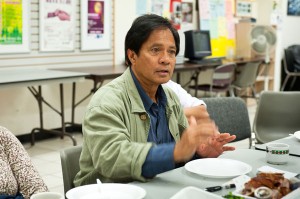China: ‘Insider’s view’
China: ‘Insider’s view’
EXCLUSIVE INTERVIEW WITH ERIC BACULINAO, BEIJING BUREAU CHIEF OF NBC NEWS
By Hermie Garcia
Eric Baculinao is the Beijing Bureau Chief of NBC News. He was in a group of Filipino students who were stranded in China when the writ of habeas corpus was suspended in the Philippines in 1971. Hoping to return to Manila after a scheduled two-week visit, his journey turned into four decades stay in China. He first visited the Philippines in 1986 and several times more later but he has lived in China since 1971, married and raised a family there. He was in Toronto recently and gave this interview in his personal capacity and not as a media person.
Q. How would you describe your having lived in China for 40 years?
A bittersweet experience. The early years of forced exile in China were quite tough, psychologically. But I got to study and understand China, which is valuable as our country tries to construct a bilateral relationship that can help our own dreams for prosperity and dignity.
A. Given your knowledge of China’s diplomatic history, what is the most likely outcome of the China-Philippine territorial conflict?
Provided our country pursues a policy of being friend to all and enemy to none, we could make it easier for China to see that its own security will be better served by a compromise solution. The resolution of its long border disputes with Russia, and with other neighbors, has proved this.
Q. To what extent are foreign media allowed press freedom in China?
A. Surely not to the extent of the press freedom that we understand in the West.
But relative to China’s past, things have improved which is why the biggest concentration of foreign media bureaus in Asia is in Beijing.
But China remains firmly under communist party rule, which seeks to manage, censor and control information to insure regime security and stability.
Q. How would you describe China’s economy? Capitalist? Has China abandoned socialism? Has there been great improvement in the lives of the Chinese since Deng Xiaoping?
A. In common parlance, it’s a hybrid economy, where socialist and capitalist components co-exist and compete, but the state maintains control of the strategic heights. China has re-defined socialism to include a major role for private and foreign enterprises. Deng’s reform has enabled the 1.3 billion Chinese to enjoy much higher standards of living–from a kingdom of bicycles, China is now the world’s biggest auto market for example–but problems of inequality have grown too.
Q. Will China become the number 1 superpower?
A. No, not in any foreseeable future at least. China’s economic output can catch up with the US in the next 10 years maybe, but the average Chinese will still remain far behind an average American or European. Can China overcome America’s more important lead in innovation, technology, military prowess and intangible global influences called “soft power”? Japan threatened to overtake the US in the nineties, but Japan later stagnated. There is always the danger that domestic challenges or turmoil, strategic economic miscalculations, or the growing conflict with America can derail China’s trajectory.
Q: China stopped supporting national liberation movements a long time ago. During Mao’s time, supporting these movements was considered an internationalist duty. Isn’t China’s “modernization” a repudiation of Mao?
A. China’s policies are changing with the times. During Mao, China defined the world’s main contradictions in terms of revolutionary struggle against imperialism. Today they see the main global contests as economic in nature, that economic development decides all other sources of power. It’s like they are saying “it’s the economy, stupid” after learning from past mistakes. And Mao himself, by fomenting the Chinese-US alliance against the Soviets, created the platform which facilitated Deng’s strategy to open up to West and engage the global economy.

Comments (0)